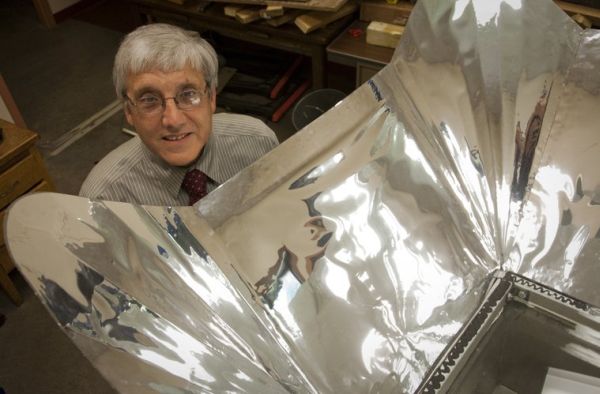The world is full of people who are tirelessly working for the betterment of the humankind and Ronald Dougherty, professor and chair of the Kansas University Mechanical Engineering Department, is one among them. Dougherty is guiding a project under which four engineering students at the University have developed an autoclave, which is powered by solar energy. Once the group succeeds in creating the sterilizer, it will be delivered to a medical camp in Sanyati, Zimbabwe.
The model which is made of metal, measures five feet in height and is shaped like a funnel. Presently, it rests at a laboratory on the West Campus of the university. Dougherty is hopeful that the sterilizer could benefit the people in developing countries because the medical instruments will be sterilized using solar energy, which means there is no need for electricity supply. It is a well-known fact that electricity is scarce in developing countries and this solar sterilizer will definitely prove a boon for the health officials in those countries.

The students wanted to have an impact on the world. They didn’t want to do another washing machine or something like that. They wanted to do something that would have a big impact on the lives of people, Dougherty said.
Kayla Dill, Stewart Bernard, Brian Hatesohl and Travis Rowe worked under Dougherty’s supervision to develop the sterilizer last year. The students developed the solar-powered autoclave as part of a senior design course. The idea to develop the sterilizer came to Dougherty when he met Scott Hoffman, a Honeywell engineer, who was willing to help his friend, Dr. Mark Byler, who works as a medical missionary in Zimbabwe and needed an autoclave, which can work without electricity.
It’s difficult for us to comprehend how terrible it is over there under the government. If you have a broken leg or need to deliver a baby and there’s no electricity at the moment to sterilize the instruments, you are kind of screwed, Hoffman said.
After meeting Hoffman, Dougherty decided to work on developing the sterilizer with the four students and Hoffman decided to fund it. Instruments are sterilized in autoclave at extreme temperatures, which kill viruses, bacteria and other microorganisms, but the instruments need to be kept inside autoclave at temperatures above 285 degrees for minimum three hours for proper sterilization.
Dougherty is happy that his students have developed the first solar-powered autoclave in the world. Though the autoclave is operational, but Dougherty is taking no chances and is now set upon fine tuning it for reliable performance.
 Follow
Follow